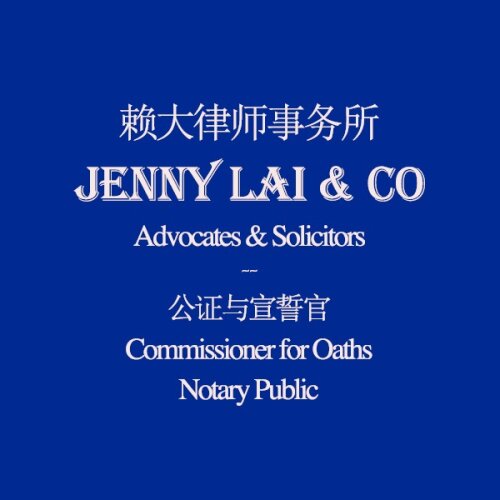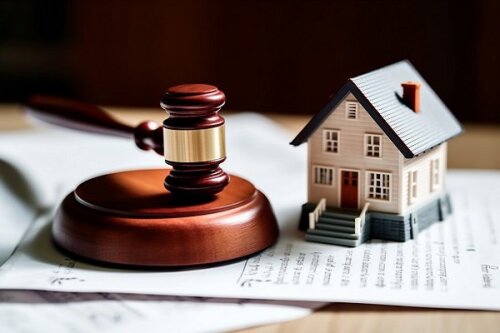Best Mortgage Lawyers in Singapore
Share your needs with us, get contacted by law firms.
Free. Takes 2 min.
Free Guide to Hiring a Real Estate Lawyer
Or refine your search by selecting a city:
List of the best lawyers in Singapore
About Mortgage Law in Singapore
In Singapore, a mortgage is a legal arrangement used to secure a loan by using property as collateral. Mortgages are commonly used by individuals to purchase residential properties or by businesses to finance commercial property investments. The process involves the borrower (mortgagor) transferring an interest in the property to the lender (mortgagee) as security for the loan. If the borrower defaults on the loan, the lender has the right to repossess or sell the property to recover the amount owed. The mortgage system in Singapore is well-regulated, providing protection for both lenders and borrowers.
Why You May Need a Lawyer
Seeking legal assistance in matters related to mortgages is essential due to the complex nature of these financial arrangements. Here are some common situations where a lawyer may be required:
- Negotiating mortgage terms and conditions with lenders.
- Reviewing contracts and understanding obligations under the mortgage agreement.
- Dealing with disputes with lenders over terms or alleged breaches of the agreement.
- Assisting in refinancing or restructuring existing mortgage agreements.
- Advising on foreclosure or repossession proceedings initiated by lenders.
- Explaining legal jargon and ensuring compliance with regulatory requirements.
Local Laws Overview
Singapore's legal framework for mortgages is primarily governed by the Conveyancing and Law of Property Act, the Land Titles Act, and various regulations imposed by the Monetary Authority of Singapore. Key aspects include:
- Legal Procedures: Mortgages must be legally documented and registered to be enforceable.
- Lender’s Power: On default, lenders have statutory rights to sell the mortgaged property.
- Borrower Protections: Borrowers have the right to redeem the mortgage by paying off the debt before foreclosure.
- Regulations: Strict lending criteria and guidelines are imposed to ensure responsible lending.
Frequently Asked Questions
What is the typical process for obtaining a mortgage in Singapore?
The process involves securing in-principle approval, choosing a property, final loan approval, signing mortgage documents, and registering the mortgage with the Singapore Land Authority.
How much can I borrow for a mortgage?
The borrowing limit is subject to the Total Debt Servicing Ratio (TDSR) framework which ensures that your total monthly debt repayments do not exceed 55% of your gross monthly income.
Can foreigners obtain a mortgage in Singapore?
Yes, foreigners can obtain a mortgage, but they may face restrictions on the type of properties they can buy. They may also be subject to different loan-to-value ratios and additional buyer's stamp duties.
What happens if I default on my mortgage payments?
If you default, the lender can repossess and sell your property to recover the outstanding debt. It's crucial to communicate with your lender early if you foresee difficulties in making payments.
Are there any penalties for prepaying my mortgage?
Prepayment penalties depend on the terms of your mortgage agreement. Some banks charge a fee for early repayment, while others may not. It's advisable to consult your lending institution.
What is refinancing a mortgage?
Refinancing involves replacing your existing mortgage with a new one, often to benefit from better interest rates, change the loan tenure, or tap into equity built up in the property.
How is mortgage interest calculated in Singapore?
Interest rates may be fixed or floating, based on the Singapore Interbank Offered Rate (SIBOR) or the Singapore Overnight Rate Average (SORA). The total interest payable depends on the principal amount, interest rate, and loan tenure.
What is a mortgage deed?
A mortgage deed is a legal document that outlines the terms and conditions of the mortgage agreement, including the responsibilities of both the borrower and the lender.
Why are legal fees required for a mortgage?
Legal fees cover the cost of drafting and reviewing the mortgage documents, conducting property title searches, and ensuring compliance with land regulations. These fees are usually borne by the borrower.
Is mortgage insurance necessary?
Mortgage insurance is not mandatory but can provide protection for the borrower’s family in case of death or permanent disability, ensuring mortgage debt is cleared and property ownership secured.
Additional Resources
For more information and assistance, consider these resources:
- Monetary Authority of Singapore (MAS): Provides guidelines on financial regulations.
- Registry of Land Titles and Deeds: Offers services for land title registration and information.
- Law Society of Singapore: Provides referrals to qualified lawyers experienced in mortgage law.
- Consumer Credit Bureau: Offers resources for understanding credit and debt management.
Next Steps
If you require legal assistance with a mortgage, consider the following steps:
- Identify your needs and gather relevant documents related to your mortgage issue.
- Research and shortlist lawyers or law firms with expertise in mortgage law.
- Schedule consultations to discuss your case, understand potential solutions, and obtain fee structures.
- Choose a lawyer who best fits your needs and proceed with their guidance for your legal matters.
- Stay informed and actively participate in the legal process to ensure the best outcomes.
Lawzana helps you find the best lawyers and law firms in Singapore through a curated and pre-screened list of qualified legal professionals. Our platform offers rankings and detailed profiles of attorneys and law firms, allowing you to compare based on practice areas, including Mortgage, experience, and client feedback.
Each profile includes a description of the firm's areas of practice, client reviews, team members and partners, year of establishment, spoken languages, office locations, contact information, social media presence, and any published articles or resources. Most firms on our platform speak English and are experienced in both local and international legal matters.
Get a quote from top-rated law firms in Singapore — quickly, securely, and without unnecessary hassle.
Disclaimer:
The information provided on this page is for general informational purposes only and does not constitute legal advice. While we strive to ensure the accuracy and relevance of the content, legal information may change over time, and interpretations of the law can vary. You should always consult with a qualified legal professional for advice specific to your situation.
We disclaim all liability for actions taken or not taken based on the content of this page. If you believe any information is incorrect or outdated, please contact us, and we will review and update it where appropriate.
Browse mortgage law firms by city in Singapore
Refine your search by selecting a city.












